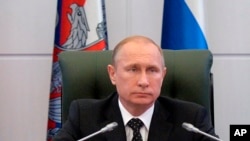A Europe-based investigative journalists’ group that follows organized crime and corruption in government has issued a report naming Russian President Vladimir Putin its "2014 Person of the Year."
The Organized Crime and Corruption Reporting Project (OCCRP) editor Drew Sullivan said Putin "has been a real innovator in working with organized crime."
"He has created a military-industrial-political-criminal complex that furthers Russia’s and Putin’s personal interests," he said. "I think Putin sees those interests as one and the same.”
The anti-corruption group alleges that the Russian president set up a system to ensure productive interconnections with criminal elements.
"Putin began arresting most major organized crime figures in Russia several years ago, but then quietly released them," it said. "That was the start of Russia’s state policy of working with organized crime. OCCRP believes Putin agreed to tolerate criminality in exchange for criminals’ support in advancing what he defined as Russian interests.”
The anti-corruption group, which has offices in Europe, Central Asia, and Latin America, based its choice on the opinions of "more than 125 OCCRP-affiliated investigative reporters and 20 reporting agencies."
Broad array of accomplices
The group said the Russian president advances his agenda with the help of a vast network of accomplices.
Executive director Paul Radu wrote in the "award" announcement that "Valdimir Putin and his siloviki" – which the RT-backed Russiapedia describes as the unofficial term for "a group of high ranked politicians ... who used to be members of the military or of the security services" – "fused a Cold War mentality with modern organized crime strategies and technologies to create a new level of transnational organized crime."
"The Russian-backed money laundering platforms have exploited the lack of transparency in the global financial and offshore company registration systems to create a new criminal financial infrastructure used by crime groups from as far away as Mexico and Vietnam," Radu said.
Russia analyst Donald Jensen of Johns Hopkins University’s School of Advanced International Studies said Putin follows a long line of Russian leaders who have operated with degrees of impunity.
The country's "rulers, from Tsarist though modern times, have largely acted as though they owned the whole country, including Russia’s people, land and resources," Jensen said. "The distinction between political power and property – clearly divided in the West by rule of law – in Russia is thus unclear. Property rights are weakly protected.
"From this core dynamic derives three fundamental aspects of Russian politics," he said. "First, corruption is not a threat to the system; it is its lifeblood. Second, the practice of corruption is a cardinal tool of governance and maintaining power for the elites. Third, the contradictions between formal constitutionalism, institutions and property rights on paper – weak as they are – and the deeper reality of patrimonial relationships [cause] permanent tension in the system."
Informed by intelligence background
Putin’s background has given him intimate knowledge of the Russian Federation’s structures and how to use them to his advantage.
"After graduating from Leningrad State University, Putin was assigned to work in the state security agencies," including the KGB, reads one passage from his official biography.
Following an official hiatus from his years within state security agencies, during which he worked in the office of President Boris Yeltsin, Putin returned to his intelligence roots in July 1998, when he was named director of the FSB, the KGB successor agency. He was elected president in the wake of Yeltsin's resignation less than two years later.
Publicly opposed to corruption
Over the years, many allegations of corruption have cropped up against Putin. But his official public position is that corruption must be suppressed.
In November, the Kremlin’s official Putin web page reported that the president submitted a draft law to the State Duma to adjust penalties for even minor corruption-related offenses.
The law was initially portrayed as an effort to crack down on bribery and other corrupt practices, but a key part of its announcement suggested otherwise.
"Analysis of legal practice shows that paying lower fines achieves the desired punishment effect in minor corruption cases and at the same time considerably increases the likelihood that the fine will actually be paid," it reads.
VOA sent a written request to the Russian embassy in Washington asking for a reaction to the anti-corruption group's report but received no response.
Russia’s state-run media recently released the results of a new poll indicating 66 percent of Russians believe corruption is high among public officials. That percentage has declined over the last five years, when 75 to 86 percent of respondents said corruption was high.
ITAR/TASS reported that, on the other end of the spectrum, the percentage who considers Russia’s corruption level low had stayed roughly the same, at about 2 percent.





